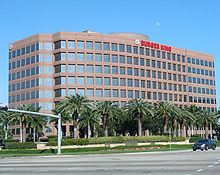
Back Burger King Afrikaans በርገር ኪንግ Amharic برجر كنج Arabic برجر كنج ARZ Burger King AST Burger King Azerbaijani Burger King Byelorussian Бъргър Кинг Bulgarian बर्गर किंग Bihari বার্গার কিং Bengali/Bangla
 Logo used since 2020 | |
 Former corporate headquarters in Miami-Dade County, Florida (now home to Lennar) | |
| Company type | Subsidiary |
|---|---|
| NYSE: BKC | |
| Industry | Restaurants |
| Genre | Fast food restaurant |
| Predecessor | Insta-Burger King |
| Founded | Insta-Burger King: 1953 Jacksonville, Florida, U.S. Burger King: 1954 Miami, Florida, U.S. |
| Founder | Insta-Burger King: Keith G. Cramer and Matthew Burns Burger King: David Edgerton and James McLamore |
| Headquarters | 5707 Blue Lagoon Drive, Miami-Dade County, Florida, U.S. |
Number of locations | |
Area served | Global |
Key people | [1][2] |
| Products | |
| Revenue | |
| Parent | Restaurant Brands International |
| Website | bk |
| Footnotes / references [3][4][1][2] | |
Burger King Corporation (BK, stylized in all caps) is an American multinational chain of hamburger fast food restaurants. Headquartered in Miami-Dade County, Florida, the company was founded in 1953 as Insta-Burger King, a Jacksonville, Florida–based restaurant chain. After Insta-Burger King ran into financial difficulties, its two Miami-based franchisees David Edgerton (1927–2018) and James McLamore (1926–1996) purchased the company in 1959 and renamed it "Burger King".[5] Over the next half-century, the company changed hands four times and its third set of owners, a partnership between TPG Capital, Bain Capital, and Goldman Sachs Capital Partners, took it public in 2002. In late 2010, 3G Capital of Brazil acquired a majority stake in the company in a deal valued at US$3.26 billion. The new owners promptly initiated a restructuring of the company to reverse its fortunes. 3G, along with its partner Berkshire Hathaway, eventually merged the company with the Canadian-based doughnut chain Tim Hortons under the auspices of a new Canadian-based parent company named Restaurant Brands International.
Burger King's menu has expanded from a basic offering of burgers, french fries, sodas, and milkshakes to a larger and more diverse set of products. In 1957, the "Whopper" became the first major addition to the menu, and it has since become Burger King's signature product. Conversely, Burger King has introduced many products that have failed to catch hold in the market. Some of these failures in the United States have seen success in foreign markets, where Burger King has also tailored its menu for regional tastes. From 2002 to 2010, Burger King aggressively targeted the 18–34 male demographic with larger products that often carried correspondingly large amounts of unhealthy fats and trans-fats. This tactic would eventually damage the company's financial underpinnings and cast a negative pall on its earnings. Beginning in 2011, the company began to move away from its previous male-oriented menu [citation needed] and introduce new menu items, product reformulations, and packaging, as part of its current owner 3G Capital's restructuring plans of the company.[6]
As of December 31, 2018, Burger King reported that it had 17,796 outlets in 100 countries.[7][8] Of these, nearly half are located in the United States, and 99.7% are privately owned and operated,[8] with its new owners moving to an almost entirely franchised model in 2013. Burger King has historically used several variations of franchising to expand its operations. The manner in which the company licenses its franchisees varies depending on the region, with some regional franchises, known as master franchises, responsible for selling franchise sub-licenses on the company's behalf. Burger King's relationship with its franchises has not always been harmonious. Occasional spats between the two have caused numerous issues, and in several instances, the relations between the company and its licensees have degenerated into precedent-setting court cases. Burger King's Australian franchise Hungry Jack's is the only franchise to operate under a different name due to a trademark dispute with a similarly named restaurant in Adelaide, South Australia, and a series of legal cases between the two.[9]
- ^ a b c d e "2023 Annual Report (Form 10-K)". Restaurant Brands International. February 22, 2024. Retrieved September 1, 2024 – via SEC.
- ^ a b c d e "Restaurant Brands International Inc. Reports Full Year and Fourth Quarter 2023 Results". Restaurant Brands International IR. February 2, 2024. Retrieved September 1, 2024.
- ^ "RBI 10K report" (PDF). rbi.com. Archived from the original (PDF) on July 18, 2019. Retrieved April 1, 2019.
- ^ "Restaurant Brand International: Burger King". rbi.com. Retrieved April 1, 2019.[permanent dead link]
- ^ "How Burger King Went From "Insta-Burger King" to Fast-Food Royalty". Yahoo. December 4, 2018. Retrieved January 2, 2022.
- ^ "Burger King Holdings, Inc. Reports First Quarter 2012 Results" (PDF). Archived from the original (PDF) on July 11, 2017.
- ^ "RESTAURANT BRANDS INTERNATIONAL INC" (PDF). Archived from the original (PDF) on July 18, 2019. Retrieved March 25, 2019.
- ^ a b "The World's Largest Fast Food Restaurant Chains". Archived from the original on June 12, 2018. Retrieved June 9, 2018.
- ^ Andrew Terry; Heatrher Forrest (2008). "Where's the Beef? Why Burger King Is Hungry Jack's in Australia and Other Complications in Building a Global Franchise Brand". Northwestern Journal of International Law and Business, 2008. 28 (2): 171–214. ISSN 0196-3228.